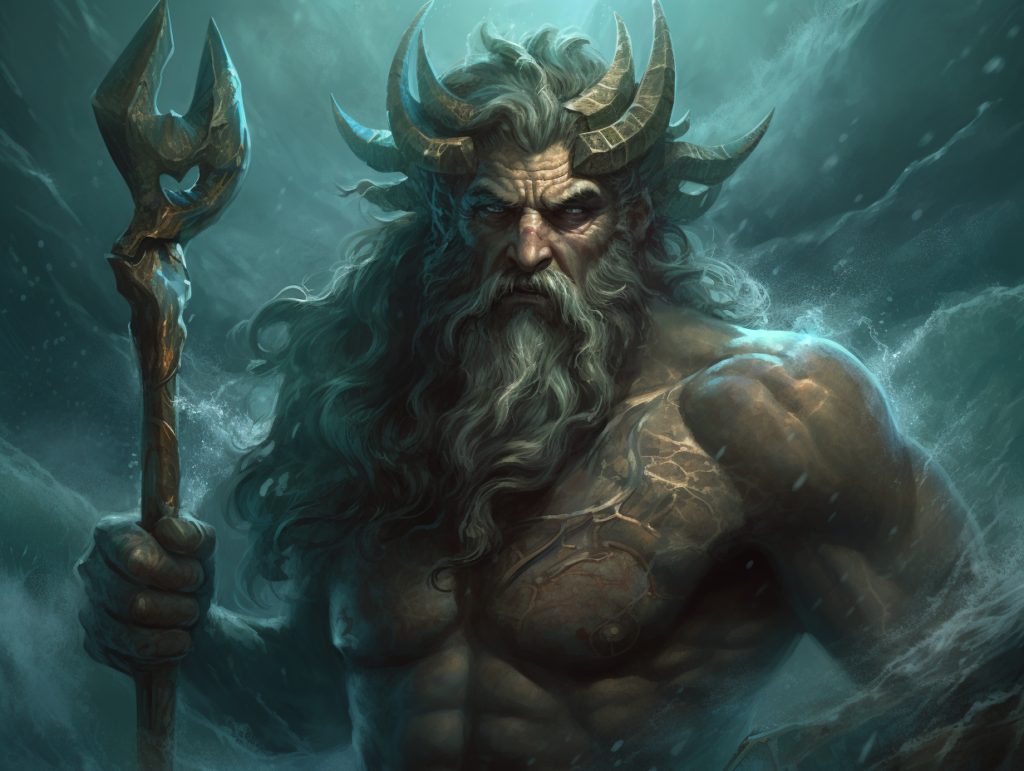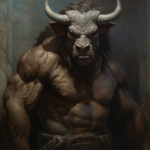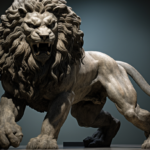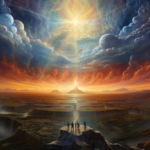Discover the awe-inspiring power and authority of Poseidon, the mighty god of the sea.
Dive into the depths of his personality as you explore his role and connection to the ocean.
Unravel the meaning behind his iconic trident and delve into his influence on weather and natural disasters.
Witness his fierce temper and rivalries, while uncovering the lesser-known aspects of his wisdom and knowledge.
Prepare to be captivated by the legacy of Poseidon, a true symbol of power and importance in ancient Greek society.
Key Takeaways
- Poseidon possesses immense power and authority as the god of the sea.
- His dominion over the oceans and waves is unrivaled, symbolizing strength and control.
- Poseidon’s role as a sea god is central in Greek mythology and represents untamed forces of nature.
- Poseidon’s influence on maritime culture can be seen in sea worship, naval architecture, sea legends, and maritime festivals.
The Power and Authority of Poseidon
You will be amazed by the immense power and authority that Poseidon possesses as the god of the sea. His dominion over the vast oceans and mighty waves is unrivaled, making him the epitome of strength and control.
Poseidon’s authority over the sea extends to all its creatures, from the smallest fish to the mightiest sea monsters. With just a wave of his trident, he can conjure tempests that can sink entire fleets and unleash tidal waves that can reshape coastlines. The sheer force of his power is awe-inspiring, and it’s no wonder that sailors and explorers seek his favor and protection before embarking on their voyages.
Poseidon’s authority isn’t just limited to the sea, but also extends to the land. He’s the creator of earthquakes, as he can strike the earth with his trident, causing the ground to shake and tremble in fear. This ability to command the very foundations of the earth showcases the extent of his dominion and highlights his unparalleled power.
As the god of the sea, Poseidon’s authority is absolute, and his power is undeniable. His ability to control the oceans and shape the world around him instills a sense of admiration and reverence in those who desire power. To have the same level of authority and influence as Poseidon is a goal worth pursuing, as it grants one the ability to shape their own destiny and command respect from all who encounter them.
Poseidon’s Role as a Sea God
As you explore Poseidon’s role as a sea god, you’ll discover his dominion over the oceans and his immense influence on maritime culture.
Poseidon’s power extends over the vast expanse of the sea, making him a central figure in Greek mythology and a symbol of the untamed forces of nature.
His role as a sea god has shaped the beliefs, traditions, and practices of seafaring civilizations throughout history.
Poseidon’s Dominion Over Oceans
Poseidon controls the vast expanse of the oceans with his mighty trident. As the god of the sea, he reigns supreme over the powerful currents and turbulent waves. His dominion over the oceans exudes an aura of indomitable strength and authority that resonates with those who desire power.
With each swing of his trident, Poseidon commands the tides, summoning tempests and creating tsunamis that can reshape coastlines and obliterate entire civilizations. His control over the vast depths of the ocean symbolizes his mastery over the unknown and his ability to unleash its untamed forces.
Poseidon’s role as a sea god grants him unparalleled control over the most expansive and awe-inspiring domain on Earth, making him a deity to be revered and feared by all who seek to harness the power of the sea.
Influence on Maritime Culture
With his formidable presence and commanding nature, Poseidon’s role as a sea god has greatly influenced maritime culture, shaping the beliefs, practices, and traditions of those who navigate the vast waters. His influence on maritime culture is undeniable, as seen in the following ways:
- Sea Worship: Poseidon’s power over the seas has led to the worship of him as a deity, with sailors and seafarers seeking his favor for safe voyages.
- Naval Architecture: Poseidon’s influence can be seen in the design and construction of ships, with sailors incorporating symbols and motifs associated with the sea god into their vessels.
- Sea Legends: The tales of Poseidon’s wrath and benevolence have inspired countless stories and legends among sailors, instilling fear and respect for the power of the sea.
- Maritime Festivals: Poseidon’s role as a sea god is celebrated through various maritime festivals, where rituals, offerings, and competitions are held to honor and appease him.
Through these influences, Poseidon’s power continues to shape and define the maritime culture, reminding sailors of the immense power and unpredictability of the sea.
The Wrath of Poseidon: Understanding His Fierce Temper
When facing the wrath of Poseidon, you’ll quickly understand the ferocity of his temper. The god of the sea isn’t one to be trifled with, and his rage can be truly awe-inspiring. Poseidon’s fierce temper is a force to be reckoned with, and those who dare to challenge him will face the full extent of his power.
In the tales of ancient Greece, Poseidon’s anger was often sparked by disrespect or disobedience. He was known to unleash devastating storms upon ships that dared to defy him, sending towering waves crashing down upon them. His wrath knew no bounds, and entire fleets could be destroyed in an instant. The sheer force of his anger was enough to strike fear into the hearts of even the bravest sailors.
But Poseidon’s temper wasn’t limited to the sea alone. On land, he could cause earthquakes to shake the very foundations of cities, toppling buildings and causing chaos and destruction. His power was immense, and his anger was a force that could shape the world itself.
To truly understand the wrath of Poseidon is to understand the raw power that lies within the depths of the sea. It’s a power that demands respect and commands obedience. To challenge Poseidon is to invite destruction upon oneself, for his temper is a force that can’t be tamed.
Poseidon’s Connection With the Ocean: Exploring His Deep Affinity
As you explore Poseidon’s deep affinity with the ocean, you’ll uncover his profound bond with the sea.
Poseidon’s watery allegiance is evident in his role as the god of the sea, where he rules over the vast expanse of water with immense power and authority.
Sea God’s Profound Bond
You can truly understand the depth of Poseidon’s affinity for the ocean. As the god of the sea, his connection with the vast waters runs deep, exuding power and dominance.
Here are four insights that reveal the profound bond between Poseidon and the ocean:
- Control: Poseidon commands the mighty waves and tides, exerting his authority over the ocean’s vastness. His power over the seas symbolizes his dominance and control.
- Protection: Poseidon safeguards sailors and seafarers, offering his divine protection amidst the treacherous waters. His affinity for the ocean extends to those who navigate its unpredictable depths.
- Mysterious Depths: Poseidon’s bond with the ocean encompasses the enigmatic depths that hide countless wonders. Just as the ocean holds secrets, Poseidon’s connection to it reflects his own mysterious nature.
- Unyielding Force: The ocean’s relentless power mirrors Poseidon’s indomitable spirit. Like the crashing waves, Poseidon’s affinity for the sea represents an unwavering force that can’t be subdued.
Through these insights, you can grasp the immense power and profound bond between Poseidon, the god of the sea, and the mighty ocean itself.
Poseidon’s Watery Allegiance
Immerse yourself in the captivating world of Poseidon, as you explore his watery allegiance to the ocean and deep affinity.
Poseidon, the mighty God of the Sea, holds an unwavering connection with the vast expanse of the ocean. His power and influence over the waters are unrivaled, making him a force to be reckoned with. He commands the crashing waves, the ebb and flow of tides, and the unpredictable currents.
Poseidon’s affinity for the ocean runs deep within his being, fueling his strength and dominance. As you delve into his realm, you’ll witness the immense power he wields, leaving you in awe of his watery allegiance.
Brace yourself for an adventure unlike any other, as Poseidon’s deep connection with the ocean unfolds before your eyes.
The Symbolism of Poseidon’s Trident: Unraveling Its Meaning
Delve into the fascinating symbolism of Poseidon’s Trident and uncover its profound meaning. As a powerful individual seeking to harness the strength of Poseidon, understanding the symbolism behind his iconic trident is crucial.
Here are four key elements that reveal the deeper meaning behind this symbol of power:
- Domination: The trident represents Poseidon’s dominion over the sea, giving him control over its vast and unpredictable nature. Just as Poseidon wields his trident to assert his authority, you too can use it as a symbol of your own dominion over the challenges and obstacles in your path.
- Power: The three prongs of the trident symbolize Poseidon’s immense power over the realms of the sea, the earth, and the sky. By wielding the trident, you can tap into this extraordinary power, granting you the ability to conquer any adversity and assert your dominance in all aspects of life.
- Creation and Destruction: The trident embodies the dual forces of creation and destruction. With a single strike, Poseidon can summon massive tidal waves or calm the raging seas. This duality represents the potential to shape and reshape your world, both by nurturing growth and by eliminating obstacles that stand in your way.
- Protection: Poseidon’s trident works as a formidable weapon to protect his kingdom and those he holds dear. By embracing the symbol of the trident, you too can invoke its protective energy, shielding yourself and your ambitions from any harm that may come your way.
Unravel the profound meaning behind Poseidon’s Trident and embody its symbolism to unleash your true power and authority in the world.
Poseidon’s Influence on Weather and Natural Disasters
Uncover the extent of Poseidon’s influence on the weather and natural disasters as it’s a fascinating aspect of the god of the sea’s power.
Poseidon, the mighty ruler of the oceans, holds dominion over the elements themselves. His power over the weather is awe-inspiring, capable of conjuring tempests and storms with a mere swing of his trident. When Poseidon is angered, his wrath manifests in the form of raging hurricanes and furious tsunamis, wreaking havoc upon the mortal world.
His control over the seas extends to the very depths of the earth, where he can unleash earthquakes and volcanic eruptions that shake the very foundations of the land. The destructive forces of nature are at his command, and none can stand against his might.
To possess such power is to hold the keys to the universe, to control the very forces that shape the world. It’s a testament to Poseidon’s authority and dominion, reminding us of the immense power that lies within his grasp. In his presence, mortals tremble, for they’re but mere pawns in his grand design.
Poseidon’s Rivalries and Conflicts in Greek Mythology
Explore the intense rivalries and conflicts that Poseidon, the god of the sea, engages in within the realm of Greek mythology. As a powerful deity, Poseidon often finds himself entangled in fierce battles and competitions, fueling his desire for dominance and control.
Here are four notable rivalries that highlight Poseidon’s relentless pursuit of power:
- Poseidon vs. Zeus: The rivalry between Poseidon and his brother Zeus is one of the most significant in Greek mythology. Both gods sought to claim dominion over the world, leading to conflicts and power struggles. Poseidon’s resentment towards Zeus often flares up, as he yearns to surpass his brother’s authority and become the supreme ruler.
- Poseidon vs. Athena: Poseidon’s rivalry with the goddess Athena was born out of their contest to become the patron deity of Athens. Poseidon offered the city a spring, while Athena gifted them an olive tree. Ultimately, Athena’s gift was chosen, leading to a deep-seated animosity between the two gods.
- Poseidon vs. Apollo: Poseidon and Apollo clashed over the control of Delphi, an important oracle site. Both gods desired to preside over the oracle, resulting in a fierce confrontation. Though Apollo emerged victorious, the rivalry between the two gods continued to simmer.
- Poseidon vs. Odysseus: In Homer’s epic, ‘The Odyssey,’ Poseidon holds a grudge against Odysseus for blinding his son, the Cyclops Polyphemus. This rivalry manifests in Poseidon’s relentless pursuit of Odysseus throughout his journey, causing countless hardships for the heroic mortal.
These rivalries and conflicts showcase Poseidon’s unyielding ambition and thirst for power, making him a captivating figure within the pantheon of Greek gods.
Poseidon’s Wisdom and Knowledge: The Lesser-Known Aspects of His Personality
Take a moment to discover the surprising depth of Poseidon’s wisdom and knowledge, as these lesser-known aspects of his personality reveal a deity with more to offer than just his power over the sea.
While Poseidon is often associated with his fierce and tempestuous nature, his wisdom and knowledge are equally remarkable. As the god of the sea, Poseidon possesses a profound understanding of the mysteries of the deep. He holds an intimate knowledge of the currents, tides, and the creatures that inhabit his domain. This knowledge grants him unparalleled control over the seas, enabling him to navigate its treacherous waters with ease.
Moreover, Poseidon’s wisdom extends beyond the sea. He’s known for his ability to offer sage advice and guidance to those who seek it. His wisdom is sought after by kings and leaders, as he possesses the insight to help them make wise decisions and navigate through difficult situations.
Poseidon’s knowledge and wisdom make him a formidable ally and a powerful force to be reckoned with. So, if you desire power, seek Poseidon’s wisdom, and tap into the vast depths of knowledge that he possesses.
The Legacy of Poseidon: His Importance in Ancient Greek Society
Immerse yourself in the rich legacy of Poseidon, as his importance in Ancient Greek society is undeniable. As the god of the sea, Poseidon held a position of great power and influence.
Here are four key reasons why he was so revered by the ancient Greeks:
- Control over the seas: Poseidon’s dominion over the vast oceans granted him the ability to shape the fate of sailors, fishermen, and traders. His power was essential for ensuring safe voyages and abundant harvests from the sea.
- Patron of cities: Poseidon wasn’t only the god of the sea but also the protector and benefactor of coastal cities. His favor was sought by city-dwellers who relied on his protection against enemy invasions and natural disasters such as floods and storms.
- Symbol of strength and virility: Poseidon embodied the masculine ideal of power, strength, and fertility. He represented the raw force of nature and was often depicted with a muscular physique, a trident, and a commanding presence.
- Connection to horses: Poseidon’s association with horses further emphasized his power and authority. Horses were symbols of strength and speed, and as the god of the sea, Poseidon was believed to have created the first horse. This link reinforced his status as a formidable and influential deity.
Poseidon’s legacy in Ancient Greek society continues to inspire awe and respect, a testament to the enduring power and significance of the god of the sea.
Frequently Asked Questions
What Are Some Common Symbols Associated With Poseidon Besides His Trident?
Some common symbols associated with Poseidon, besides his trident, include horses, dolphins, and the sea itself. These symbols represent his power and control over the ocean, and the strength he possesses as the god of the sea.
How Did Poseidon’s Relationship With Other Greek Gods and Goddesses Influence His Role as a Sea God?
Poseidon’s relationship with other Greek gods and goddesses greatly influenced his role as a sea god. His power and influence were heightened through alliances and conflicts, solidifying his position as a formidable force in the divine hierarchy.
Are There Any Specific Myths or Stories That Highlight Poseidon’s Wisdom and Knowledge?
“Are there any specific myths or stories that highlight Poseidon’s wisdom and knowledge? Yes, there are tales of Poseidon outsmarting his rivals and using his vast understanding of the sea to his advantage.”
How Did Poseidon’s Influence on Weather and Natural Disasters Affect Ancient Greek Society?
Poseidon’s influence on weather and natural disasters made ancient Greek society fear his power. They had to appease him to avoid his wrath. His control over the seas made him a force to be reckoned with.
In What Ways Did the Worship of Poseidon Impact the Daily Lives of Ancient Greeks?
Poseidon’s worship impacted the daily lives of ancient Greeks in numerous ways. From providing protection at sea to influencing the weather, his power and presence brought a sense of awe and reverence, shaping their actions and decisions.
Conclusion
In conclusion, Poseidon’s personality as the god of the sea is complex and multifaceted. His power and authority are evident in his role as a sea god, and his fierce temper is a force to be reckoned with.
His deep affinity with the ocean is a testament to his connection with the natural world. The symbolism of his trident holds significant meaning, and his influence on weather and natural disasters is undeniable.
Despite his rivalries and conflicts, Poseidon’s wisdom, knowledge, and importance in ancient Greek society leave a lasting legacy.







